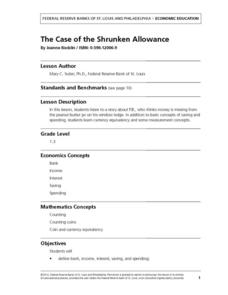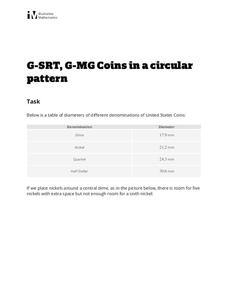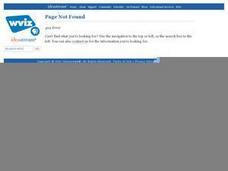Curated OER
Money Talks Canadian Money
Learners use newspapers, games and journal writing activities to examine the importance of money and the role it plays in daily life. They complete several math problems, fill out worksheets and practice changing varying amounts.
LearnEnglishFeelGood.com
Count or Non-Count Nouns?
Many learners struggle with the difference between count and non-count nouns. When do you use a few or a little? Or much or many? Take a look at ten sentences where young grammarians can use context clues to decide which noun fits in the...
Curated OER
Nickel/Penny Grab
First graders examine the coins nickels and pennies. In this math lesson, 1st graders compare the value of the two sets of coins and determine their value. Additionally, students explore counting sets of coins that have pennies and...
Curated OER
It's On Sale
First graders read the book The Great Pet Sale to learn about economics and advertisements. In this economics lesson plan, 1st graders read the book The Great Pet Sale and define related vocabulary words. Students compare prices to find...
Curated OER
Money
In this money instructional activity, 2nd graders count four sets of coins that go up to one dollar. The coins mostly consist of quarters.
Curated OER
Money Versus Trade
Students discover the importance of exchanging money in a market. In this economics instructional activity, students discover natural resources and how one can barter with those resources. In addition, students complete worksheets and...
Federal Reserve Bank
The Case of the Shrunken Allowance
An allowance is an important thing! Make sure your kids know how to save and spend their own money. Using the book The Case of the Shrunken Allowance as a starting point, this plan covers income, spending and saving, counting, and more.
Illustrative Mathematics
Coins in a Circular Pattern
What starts as a basic question of division and remainders quickly turns abstract in this question of related ratios and radii. The class works to surround a central coin with coins of the same and different values, then develops a...
Curated OER
Buckets of Bucks for World Hunger
Students participate in a nonprofit organization activity for hunger outreach problems. In this service project lesson, students practice counting coins, complete a service project for a hunger outreach, discuss nutrition and healthy...
Curated OER
Savings Accounts and Interest
First graders study money, banks, and getting interest on money. In this consumer math lesson, 1st graders listen to Stan and Jan Berenstain's, Berenstain Bears' Trouble With Money. They use the concepts in the book to discuss...
Curated OER
How do You Stack Up? Revisited
Students estimate the thickness of coins. In this stack up instructional activity, students stack pennies, nickels, dimes and quarters. They calculate and record the thickness of each coin. Students stack coins and estimate the height...
Curated OER
Buggin' Out (Identifying and Adding Amounts of Money)
Students explore consumer math by participating in estimate exercises. In this currency lesson plan, students identify and define each piece of U.S. currency and their value to the monetary system. Students complete several money...
Curated OER
Making Change
Second graders explore how to incorporate a new type of technology, the cash register and/or a calculator, as a motivational tool for solving real life problems. They practice estimating money and counting back change from $20.00.
Curated OER
Give Me the Money
Students view a money transaction on video and identify the steps involved in making a purchase and calculating change. They write out original money math problems and exchange them with classmates.
Curated OER
Addition With Coins and Dollar Bills
For this coins and bills worksheet, 2nd graders solve 5 addition problems using coins and bills instead of numbers. Students write their answers up to $5.00 on the lines provided.
Under the Dome
Penny Cube
Use volume to count your change. Pupils watch as a cube is filled with stacks of pennies and make an estimate on how many pennies are in the cube. The teacher provides additional information to the class members about the size of the...
Curated OER
Money Counting Worksheet
In this counting money worksheet, students study the coins in each of 4 rows and count the amount of money they total. Students write the total amount.
Curated OER
Money Counting Worksheet
In this counting coins instructional activity, students look at the coins in each row, total their amount, and write their total in the blank.
Curated OER
Money Counting Worksheet
In this counting coins worksheet, students look at the coins in each row, total their amount, and write their total in the blank.
Curated OER
Combining Coins to Make Equal Monetary Amounts
Third graders determine how to make equivalent amounts of money using different sets of coins. In this money lesson, 3rd graders review money vocabulary and coin values before determining how to count bills and coins in different sets to...
Curated OER
Money Bags
Third graders explore different combinations of coins that can be used for specified amounts of money using paper money and tree diagrams. They write money amounts in different forms. Groups utilize a tree diagram imbedded in this lesson...
Alabama Learning Exchange
Coins to Bills!
Students practice using money at a grocery store. For this money lesson, students get familiar with grocery store ads and work in pairs to use these ads to select food items to purchase using money manipulatives. Students practice being...
Curated OER
My Extraterrestrial Counting Book
In this extraterrestrial counting activity, students assemble and color a mini personal book on counting from one to ten with extraterrestrial objects.
Scholastic
Study Jams! Making Change
This dreamy resource has little ones computing the change on the purchase of an ice cream cone. Mia describes each step in two methods: subtraction of decimals and counting up from the sale price.
























